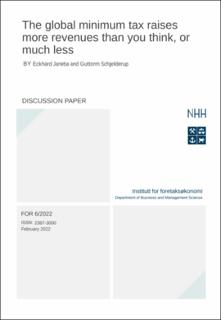The global minimum tax raises more revenues than you think, or much less
| dc.contributor.author | Janeba, Eckhard | |
| dc.contributor.author | Schjelderup, Guttorm | |
| dc.date.accessioned | 2022-02-07T09:52:38Z | |
| dc.date.available | 2022-02-07T09:52:38Z | |
| dc.date.issued | 2022-02-07 | |
| dc.identifier.issn | 2387-3000 | |
| dc.identifier.uri | https://hdl.handle.net/11250/2977415 | |
| dc.description.abstract | The OECD’s proposal for a global minimum tax (GMT) of 15% aims for a reversal of a decline of corporate tax rates. We study the revenue effects of the GMT by focusing on strategic tax setting effects. The direct effect from less profit shifting increases revenues in high-tax countries. A secondary effect, however, is that the value of attracting foreign investments increases, which intensifies tax competition. We show that when governments compete via firm-specific or uniform subsidies, the revenue gains from less profit shifting are exactly offset by higher subsidies. When competition is by tax rates, revenues may increase however. | en_US |
| dc.language.iso | eng | en_US |
| dc.publisher | FOR | en_US |
| dc.relation.ispartofseries | Discussion paper;6/22 | |
| dc.subject | Global Minimum Tax | en_US |
| dc.subject | Tax Competition | en_US |
| dc.subject | OECD BEPS | en_US |
| dc.subject | Pillar II | en_US |
| dc.title | The global minimum tax raises more revenues than you think, or much less | en_US |
| dc.type | Working paper | en_US |
| dc.source.pagenumber | 34 | en_US |
Tilhørende fil(er)
Denne innførselen finnes i følgende samling(er)
-
Discussion papers (FOR) [566]
